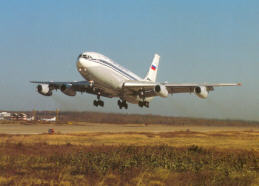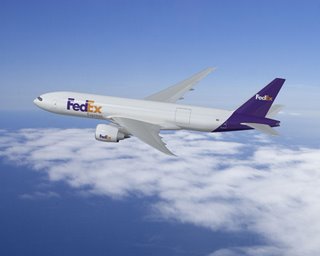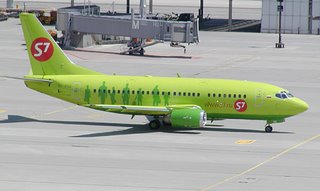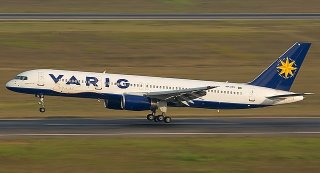Are you tired of the continual cutbacks and restrictions that almost every airline has implemented over the last few years? No meals in economy, or if you're on Northwest, no food at all... Less seatroom, no magazines, no pillows, no blankets... And for some people, the worst restriction is on that little habit that many take up that's called smoking. Smoking is understandably banned on all US flights and in most countries by now (Aeroflot bans smoking too, but do you actually believe them?). And smokers that do want to light up whilst in flight have to find an airline that will accomodate them - not an easy thing nowadays.
Well, traveling smokers will no longer be forced to go through Nicotine Withdrawl for several hours while in flight, because a brand new airline is being launched - especially for smokers. That's right, the Dusseldorf, Germany-based Smokers' International Airline (Smintair) will allow smoking in all 138 seats on board two leased Boeing 747-400s. Flights will start on March 26 between Dusseldorf and Tokyo's Narita airport.

Smintair's chief, Alexander Schoppmann (himself a smoker, of course), said that he had been planning the airline for over a year. "I have been a traveler for the best part of 50 years," he told CNN. "I have seen the level of service go down and the price go up."
Each passenger will also be able to watch TV on 15-inch screens and be able to access the internet inflight.
"SMINTAIR will bring back the joy of flying by offering only 30 first class and 108 business class seats on a "Jumbo Jet", one of the most reliable planes in the World," boasts its
website. Being cooped up in a smoke-filled "Jumbo Jet" for thirteen hours doesn't exactly sound like my idea of the Joy of Flying, but perhaps it does to some people. Then again, I belong in the non-smokers category, a category that Smintair seems keen on attracting.
"Non-smokers will find the cabin air more refreshing than on any other flight with any other airline, as SMINTAIR adds fresh outside air to the conditioning system!" its website proudly proclaims. But it's no secret that the air on board an aircraft is just circulated around, no matter how much 'outside air' is added.
But, if this sounds like a good airline to you, you're not only welcome to fly it, but invest in it as well. All you need to secure a 1% stake in Smintair is one million euros. And the airline's website certainly tries to assure you that your investment will be a smart one: "It is of extreme logic, that an investment in SMINTAIR will be extremely profitable, as it is connected to a lower than average risk. A very conservative business plan, even calculating Kerosene prices on the basis of US$100/barrel crude oil, foresees a profit margin of more than €50Mio/p.a. (per airplane), taking fully booked aircraft into consideration. With only 138 available seats in each of our BOEING 747-400ER and tens of millions of smokers in Europe and Asia, this is certainly not an impossible task."
Or is it? I know one thing's for sure - I, like most non-smokers, would probably prefer to book on Lufthansa instead. After all, there's no smoking there, and I'm sure that their CEO (the guy with the beard in the picture) is less amatueurish than Smintair's - I'll leave you today with the first two paragraphs of his letter to potential fliers (see the rest
here):
Ladies and Gentlemen, dear Guests,

before I would like to share my next to 50 years of experience as an airline passenger with you, I'd like to take the opportunity to clear one of the biggest lies floating around everywhere in the World:
"Second Hand Smoke (SHS, a.k.a. ETS, Environmental Tobacco Smoke) damages your health".
The WHO (World Health Orgaisation) confirms in all of it's studies concerning the subject, that ETS has not even a statistcally relevant effect on the non-smoker's health! If you want to go deeper into the subject, without prejudice, please refer to following link: http://www.thetruthisalie.com. You will be more than surprised of the amount of facts and neutral proof. By the way, did you know that the NAZIs also sported a huge Anti-Smoking campaign? Yes, they did and the one we experience now, frightningly, carries exactly the same insignia.
Now on to a more pleasant subject than the NAZIs and a fat lie:
In the 50s, 60s and 70s, I was always looking foreward to every flight, enjoying a luxurious experience above the clouds. The stewardesses (yes, that was the job title and they were proud of it!) were all friendly, very pretty and, in their fresh uniforms, elegant. In general, the service was first class, even back in the "economy" section. The spacing between the comfortable seats was sufficient, in the then smaller aircraft, even for tall people like me. For a long time, you were greeted with a vast selection of "Monte Christ" cigars, in LUFTHANSA's First Class, even before the plane took off! However, times do change. "Thanks CHRIST", one should exclaim, as everything becomes even more comfortable, .... except for the life of an airline passenger!




























